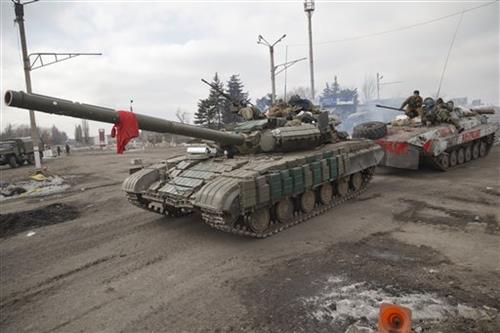
By PETER LEONARD
Almost every building was gravely damaged, nearly every window smashed in this Ukrainian town left unrecognizable by months of relentless shelling. Children played in the rubble where their homes once stood, while neighbors boiled water in open fires as temperatures dipped below freezing.
Two days after government forces fled Debaltseve in disarray, leaving the Russian-backed separatists in total control of the strategic town, all was quiet Friday.
Residents who could not or refused to flee came blinking out of makeshift shelters to soak up the rare winter sun. Across town, Cossack fighters rolled jubilantly away on commandeered trucks, tanks and armored vehicles, having secured another decisive victory for the rebels.
Yevgeniya Fomichova, whose gutted apartment was just three blocks away from a Ukrainian military encampment, said she and more than a dozen neighbors cowered in basements for seven months. The nightly terror of shelling worsened in January as separatists massively intensified their onslaught.
“For a month we’ve had no bread and water,” the 60-year-old said, adding that it had been weeks since she and her neighbors had bathed.
“Look at this, we are as filthy as devils,” she said, trying to rub away the dirt on her soiled maroon coat.
Behind her, a gaping hole left by a shell strike revealed the shattered remains of an apartment basement, much like the one in which she took refuge.
Debaltseve’s ordeal had been expected to end with the cease-fire agreement forged last week by the leaders of Ukraine, Russia, Germany and France. Instead, the attacks intensified as the rebels moved to capture a town deemed strategically important for its role as a railway hub linking the two largest separatist-held cities.
Sporadic violations of the truce continued Friday.
A Ukrainian military spokesman said separatists fired on government positions nearly 50 times in the preceding 24 hours, while the rebels claimed that Ukrainian forces had violated the cease-fire 20 times.
The village of Kurakhovo, west of the rebel stronghold of Donetsk, was hit by Grad rockets and the village of Berdyansk, near the key port city of Mariupol, was hit overnight by artillery and mortar fire, said Lt. Col. Anatoliy Stelmakh, a Ukrainian military spokesman.
At a crossroads along the highway to Debaltseve, Cossacks and other rebel fighters were shipping out Friday, taking captured Ukrainian armored vehicles and trucks with them. On the road out of town, sappers detonated anti-tank mines left behind by the retreating Ukrainian troops.
Cossacks, who spearheaded imperial Russia’s expansion and helped guard its far-flung outposts, trace their historic roots to both Ukraine and southern Russia. They faced persecution under Bolshevik rule but resurfaced after the 1991 Soviet collapse and are now recognized in Russia as an ethnic group who consider themselves descendants of the czarist-era horsemen.
The war in eastern Ukraine has killed more than 5,600 people and forced over a million to flee their homes since fighting began in April, a month after Russia annexed Crimea. Russia denies arming the rebels or supplying fighters, but Western nations and NATO point to satellite pictures of Russian military equipment in eastern Ukraine.
In a more open gesture of pressure, Moscow issued a stern warning Friday to cash-strapped Ukraine that it needed to remit payment soon if it wants to continue receiving Russian gas, raising the threat of a cut-off during the harsh winter.
Following a bruising price and debt dispute last year, Russia now requires Ukraine to pay in advance for gas shipments. Russian Prime Minister Dmitry Medvedev warned that its most recent payments would only be good for another three to four days.
In Debaltseve, rebel talk of victory was mixed with contempt for the pro-Western Ukrainian government and its troops.
One masked fighter, who gave only his nom de guerre, Scythian, said he used to train a Ukrainian mixed martial arts team before taking up arms against the government.
“I will no longer represent the Ukrainian flag,” he said as he sat atop a tank with a dozen other fighters. “They sold out the flag, they sold out this country. I won’t compete for them anymore.”
The Debaltseve residents who stayed behind directed their anger almost exclusively at the Ukrainian forces, although the bulk of the damage to the town appeared to have been caused by separatist shelling.
“I hope they kick the Ukrainians out of the Donbass region, so we can live peacefully. We will rebuild all this through collective effort,” said Ina Morozova, a 48-year-old railway signal operator. “We’ll survive. Where else are we to go?”
The warring sides were supposed to begin drawing back heavy weapons from the front lines Tuesday, but international monitors say they’ve seen no sign of that yet.
Russian and Ukrainian military officials overseeing the hoped-for peace process announced Friday that the Ukrainian government and the rebels had worked out a plan to begin the weapons pull-out.
Heidi Tagliavini, an envoy for the Organization for Security and Cooperation in Europe who led the talks with Russia and Ukraine that also included rebel figures, said she believes the unrest in Debaltseve will not quash the prospects for peace.
However, she added, “there is not a single day in the Ukrainian conflict when we can feel sure what the next day will bring.”
____
Associated Press writers Jim Heintz in Kiev and Vladimir Isachenkov in Moscow contributed to this report.



